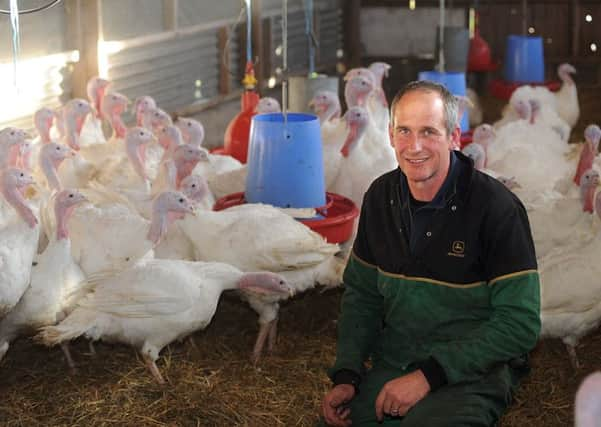Talking turkey in a suitcase


He was carrying a suitcase and could have been setting out on holiday heading for the railway station or another connecting bus but it was the contents of the suitcase that, had they been known to other passengers, may have raised a few eyebrows. He had turkeys inside – not live ones but samples.
Maurice’s Stanacre Poultry business that trades as Colley Fold Turkeys is one of the longest established turkey farms in the UK having started in 1957 when he purchased a couple of acres at Outwood near Wakefield.
Advertisement
Hide AdAdvertisement
Hide Ad“In those days I would either take the turkeys out on my bike or on the bus in my suitcase to show prospective customers. I could get four in quite snugly. It all came about when I was working for David Brown’s poultry farm at East Ardsley. My brother worked for him and I left Avondale Caravans where I was a joiner to get involved with the maintenance of farm buildings and erecting sheds.
“He had some turkeys and had a batch that a butcher had sent back. It was getting really close to Christmas and he asked whether I could go out and sell them. I sold the lot in five minutes in East Ardsley. Back then there was a butcher on every street corner so it was easier and there weren’t the regulations there are today that would have made it impossible.
“I then had the thought that if I could sell for somebody else I could sell for myself and the success I had the following year when I bought 102 of my own poults from a lady in Nottingham led me to thinking this was what I wanted to do.
“I’d always fancied farming so I bought this place thanks to my mother-in-law loaning the money. It was initially just two acres and we added another acre a few years later. We ploughed the land and put potatoes in, pulled down stone cottages, sold the stone to a local builder; and put up the sheds I needed.
Advertisement
Hide AdAdvertisement
Hide Ad“The following year we did 250 turkeys and the year after we were up to 500. At that point I said to my wife Gina (Georgina) I would stop at home rather than carry on at David Brown’s farm and look for another job that fitted in with the turkey business. I’m still looking 60 years on! The most we ever processed was 30,000 turkeys in twelve months during the early 70s when we had a team of about 17 mainly part-time female staff all hand plucking.”
At one time Maurice was supplying turkeys as far afield as London, Birmingham and Manchester.
“Once I’d been going a few years it was smashing. I’d got to know all the wholesalers personally and we were great friends. Leslie Lowery at the market in Manchester and William Daniels in Birmingham were two I visited with samples in my suitcase.
“They took up buying from us regularly throughout the year and it all built from there. We were making good money and I was having a great time. I thought I was going to be able to retire at 40, but here I am at 83 still selling turkeys. I’ve never actually wanted to retire though and I cannot understand why people do when you’re doing a job that you don’t mind.”
Advertisement
Hide AdAdvertisement
Hide AdToday’s turkey business in terms of numbers is a far cry from Maurice’s heyday. Stanacre Poultry is now more about wholesale of chicken but turkeys for Christmas play a lead role in the coming weeks. Maurice’s son, Dan, has worked alongside his father most of his working life following six years on a rhubarb farm and studies at Bishop Burton College.
“When I joined dad I remember us rearing, processing and selling 5000-6000 turkeys for Christmas. When we joined the Common Market is when all the cheap stuff came in from abroad and our numbers plummeted. It has taken years to build back up and find that niche market where people are prepared to pay the right price for a properly slow-grown mature turkey.
“There are some turkeys that will be bought this year that we know will have been killed out very young and won’t have much meat on them so I’d say buyers beware. Ours have a full life, are properly mature and we have customers that come back year after year. We’re also not the most expensive either.
“These days we start with 1000 day-olds in June/July that we buy from Hollyberry Hatcheries in Lincolnshire. We have bronzes and whites. The whites are yellow as chicks and the blacks (bronzes) look like little penguins. We keep them nice and warm in the brood house for five to six weeks and then move them to the free-range sheds where they have the opportunity to go outside if they want.
Advertisement
Hide AdAdvertisement
Hide Ad“When dad started there was a lot that was easier. These days it’s all regulations and paperwork and there’s always someone wanting to inspect something. You’re treated as though you’re out to poison everybody. We look after our turkeys and have supplied everyone from families to butchers, wholesalers, hotels, pubs and restaurants since dad started in the 1950s. Hopefully, we will always continue doing so.”